March 1, 2016
The Q5 with Adam Huska

Winter 2016. For our Newsletter each quarter we will reach out to a different goaltender for the “Quarterly 5 (Q5)”. Asking 5 questions in an effort to examine the unique perspectives they have on their games.
For our 10th installment of the Q5, we turn our attention to the USHL Green Bay Gamblers’ 1997 born Slovakian, Adam Huska. We are not the only ones; as during his second year with the team, Adam has amassed quit the resume. Leading the league in 3 goaltending categories at the time of print and considering his performance at the 2016 World Junior Championships with Slovakia’s National Under 20 team, Adam will have his pick of Division 1 schools to attend when he is ready. In June, he was selected to the New York Rangers in the 7th round of the NHL Draft, and they couldn’t be more pleased with his recent success. A young man of…not many words, we bring you the Q5, with Adam Huska!
![IMG_4388[1]](https://gdiusa.us/wp-content/uploads/2016/03/IMG_43881-300x225.jpg)
Q1: You are clearly comfortable and confident here on the team and in the country. Having been here for only a short while, how have you adjusted so quickly?
A: I am a smart and funny guy. It’s been easy for me.
Q2: What are the differences between the US and Slovakian hockey philosophy and goalie training styles.
A: I think hockey is the same everywhere in the world, but just the players are different.
Q3: How do you describe your game now? What has changed since arriving in Green Bay?
A: I want to play how I feel. I am just focusing on a lot of details better than last season.
Q4: With the USHL seemingly unable to crack you, have you done all that you can at this level and what is the next step for your development?
A: I want to play Division 1 college hockey for the next couple of years. But first the Clark Cup!
Q5: Every kid dreams of playing in the National Hockey League. Having been drafted now, has that always been the end goal? How do you think that you will reach and stay in the NHL?
A: Yes it is my dream play in the NHL. Being drafted doesn’t mean the end for me. There is much work to be done still.
Thanks for the super simple responses Adam! If you know him, you know this was a fun interview. With more success on the horizon, we wish you all the best. Follow Adam @ADAM_HUSKA on Instagram.
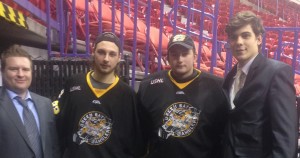
Coach Honick w/ Kevin Reich, Jason Pawloski, and Adam Huska in 15/16
October 18, 2015
Q5 with Keegan Asmundson
For our Newsletter each quarter we will reach out to a different goaltender for the “Quarterly 5 (Q5)”. Asking 5 questions in an effort to examine the unique perspectives they have on their games.
In our 9th installment we talked with Keegan Asmundson, a long time friend, student, and coach of ours. We are proud to announce that Keegan will be playing his first full year of professional hockey in the ECHL. After finishing school at Canisius College last season, he was brought into the Washington Capitals system, spending time with their AHL and ECHL affiliates. The Buffalo Sabres invited him to their September rookie camp. Then the Toronto Maple Leafs required his services with their AHL team, the Marlies. Signed since August with their ECHL affiliate, the Orlando Solarbears, Keegan has since been traded to the Evansville Icemen, the ECHL affiliate of the Ottawa Senators. These teams are all more than intrigued by Keegan’s 6’5” frame and passive style of play. Bread into the GDI philosophy since his Minnesota high school playing days, Keegan has enjoyed success and adversity, as have so many quality goaltenders. Light hearted yet full of fire; let’s now bring you the Q5, with Keegan Asmundson!
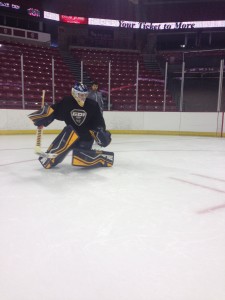
Q1: Let’s start with the obvious question; what’s it been like to put yourself on display for 4 NHL teams in a 7 month stretch? We know you have a sarcastic goal of playing in all 30 teams’ organizations.
A: Lots of traveling! It has been a great experience these past 7 months and I have been learning what it takes to be a pro. As an undrafted free agent leaving Canisius I had the opportunity to make my professional debut with the ECHL South Carolina Stingrays last year. Coming from college where I knew everyone for 4 years to being the new guy was a little challenging but fellow GDI USA guy, Jeff Jakitas was there, and I was lucky enough to have him take me under his wing and give me some advice. Thanks again Jacko! From there I went up to the Hershey Bears in the AHL for a month. I also attended Washington’s development camp after the draft. From there I went to Buffalo Sabers rookie camp in September and then spent some time at the NHL training camp. It was great to be back in Buffalo. Next was a quick stop at Toronto Marlies camp, then a quick turnaround, driving 24 hours down to sunny Orlando, Florida. I was recently traded and drove another 13 hours to Evansville, Indiana.
Q2: With each team you have come across a different goalie coach tasked with shaping their club’s puckstoppers emerges. How does a goalie try to play the game that has got them to that point, while staying open minded to what they have to offer?
A: Every goalie coach I have worked with since I turned pro has basically the same teaching principle, simplify the game. Both the goalie and goalie coach have got to the pro ranks for a reason and I have been lucky enough to pick each guy’s brain on various goaltending topics. I had Mitch Korn, Olaf Kolzig, and Scott Murray in Washington and Andrew Allen and Bob Janosz in Buffalo. I’m a big believer in always trying to learn. If it’s one small thing or 30 things, I can take that knowledge and apply it to my game, making myself a better goalie and help the team win more games. The day you stop trying to make your game better is the day you could be without a job. There is not much left to learn when it comes to basic movement like t-pushes and shuffles at the professional level, only daily maintenance.
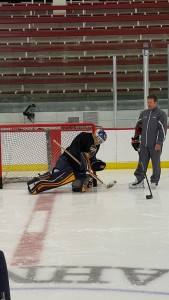
Q3: You have worked with many of our GDI USA affiliated coaches throughout your career. From your time with the NAHL Austin Bruins, where Elliott Hogue guided you, 3 years spent with Canisius coach John Daigneau to lean on, consulting with current USHL Dubuque Fighting Saints coach Matt Millar each off-season, and even working alongside the staff at this summer’s NDC: GDI WEST. What do you try to take from each opportunity you get to grow and share?
A: All of those coaches have played a huge part in where I am now. I just want to say thank you to all of them for everything. I have always been a late bloomer so working with goalie coaches who understood the position and style that would fit my body size has been a big reason for my strong foundation. The best part about working with those coaches is that they have all been with me through various points in my career. I know my game has evolved over the years and is still developing, but it’s awesome to have the GDI USA coaches that I can always come back to and talk about anything with them.
Q4: With so many of today’s best goalies and most desired prospects judged on size; and with you being one of those massive bodies in front of the net; how do think size relates to the position? Can it be a pro and a con?
A: In today’s game, having size is definitely a pro. At the same time, a big guy who is not athletic is a con. Being a “big guy” goalie has a lot of advantages, but there is also more surface area for pucks to hit. That makes rebound control very important. There are some situations where being a “big guy” goalie is challenging. The net is still 4’ tall and it can be challenging to fit into positions like the VH and RVH. Size is something you can’t teach but you can teach the correct way to use you’re size most effectively. Because I have been able to work with those GDI USA coaches who understand my size and the position I have been able to play and be successful at high levels of hockey. I also have good athleticism which can be a deadly combination. I enjoy watching other “big guy” goalies in the NHL to see how they play certain situations and how they use their body effectively.
Q5: You did not play as much as you would have wanted to through your junior year in college. Yet in your senior season you took the reins and it’s given you the chance to turn professional. How did you manage this and what do you think you learned from it that will resonate with goalies in the same situation?
A: I had to wait my turn in college and make the best of the opportunity I got. Was it easy? No, but anything worth doing is never easy. I was able to manage this situation by focusing on what I can control, Attitude and Effort. I didn’t worry about why the coach is playing him over me. It would have been very easy to be negative and say I got the shaft but I also had to be sure I was still being a good teammate and stay positive through all of the ups and downs. Another thing that also helped me was finding other things to do to take my mind off of hockey. Golf, homework, going on walks, or any other hobby helps keep the mind fresh and focused for the next opportunity you get. I was also lucky enough to be playing Division 1 Lacrosse my first two years at school. Because I was contributing to my lacrosse team, it allowed me to escape from hockey and I was also able to use my “big guy” body to hit everything that moved and lead my team in penalty minutes.
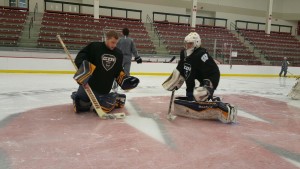
Bonus Q: What is in store for you after your playing days? We know you have a future in coaching and are an excellent goalie coach, but other interests are often kept idle as we commit ourselves to our craft.
A: I have thought a little about what I want to do when my playing days are over. GDI USA coach Brennan Poderzay and I have thought about entering the WWE and going after the Tag-Team Championship! I would really like to still be involved in sports one way or another. I also like the feeling of being on a team and could see myself going in a coaching direction. I really enjoy working with younger goalies and giving back what I have learned over the years. I do know that I do not want a 9-5 desk job. I’d go into farming, construction, or other kind of manual labor job before that.
It’s been an entertaining short story for Keegan recently; we hope it translates into a long and prosperous read from here. Thanks for sharing and laughing, and best of luck Keegs!! Follow Keegan Asmundson @keegs33 on twitter.
February 18, 2015
Q5 with Kevin Reich
For our Newsletter each quarter we will reach out to a different goaltender for the “Quarterly 5 (Q5)”. Asking 5 questions in an effort to examine the unique perspectives they have on their games.
Our 8th installment of the Q5 brings us some international flavor in Germany’s Kevin Reich. Now with his second USHL and third North American team in the Green Bay Gamblers, 1995 born Reich can be considered a well traveled goaltender. Recently returned from the 2015 World Junior Championships in Canada, Kevin is keeping his focus on the team at hand, with one eye still locked on the NHL, the purpose of his journey overseas. Let’s now bring you the Q5, with Kevin Reich!
Q1: Let’s start with the WJC, what was that experience like? We all saw you play tremendously against Team Canada.
A: It was an amazing experience to play in a tournament like this and face such good players like Connor McDavid. It was so much fun to play in Canada in front of so many fans, it was an unreal feeling.
Q2: Returning to the USHL must be a change of pace and timing for you. In your second season in North America, what are the challenges of the game here vs. the international style?
A: Yes it’s a change, but it’s the same game. It doesn’t matter if it’s at the WJC or in the USHL; I just focus on stopping the next puck and let my team know that I’m there for them and that they can trust me. The international style is really fast and a lot of skill. That means you have to be ready all the time, it’s the same here.
Q3: You have skated with Dubuque Fighting Saints Coach Matt Millar and Green Bay Gamblers Coach Ryan Honick so far in the US, both GDI Coaches. How does their coaching philosophy differ from the coaches you have worked with in Germany?
A: I worked in Germany with GDI when I was young and then Pierre Groulx who was the Goaltending Coach for the Montreal Canadians, so I’m kind of used to the coaching style here. I feel I’m trained like a North American goaltender.
Q4: At the end of last season you sat 5th on the NHL Central Scouting list of North American Goaltenders (you are listed by where you play), you were not drafted. What is next for you?
A: That’s simple; it just means that I have to work harder because I want to play in the NHL. I’ll stay the course.
Q5: Getting to play professional hockey in two games in the prestigious DEL in Germany at the age of 17 must have been a thrill. Does that moment continue to motivate and drive you?
A: Playing professional hockey at that early age was just the beginning of what I hope is a long successful career in pro hockey. I’ll do what it takes to get there and stay there.
Thank you Kevin, we wish you all the best in your endeavors. Continue to showcase yourself and represent your country. Follow Reich and his road to the top @KevinReich31 on twitter.
August 22, 2014
Q5 with Bryan Mountain
For our Newsletter each quarter we will reach out to a different goaltender for the “Quarterly 5 (Q5)”. Asking 5 questions in an effort to examine the unique perspectives they have on their games.
In our 7th installment of the Q5, we spoke with a GDI legend. Now having graduated from Northeastern University with a degree in Criminal Justice, Bryan Mountain’s past, present, and future will surely intrigue you. Bryan’s legacy has been cemented in the GDI camp circles after his first summer in 1998 when it was a well known fact that an undersized student by the name of Mountain was a bigger, stronger, faster, harder working, athletic machine than anyone else to come through. He became the standard for which all fitness tests, fitness drills, and on ice efforts would be set. In fact, if a bantam aged Bryan could finish the 2 mile run before the junior goaltenders in attendance, they were made to run it again the next day…and all 16 in that group ran twice. After a career spanning the BCHL, USHL, and 5 seasons in Hockey East, Bryan has decided to pursue another path within the game. Representing players has become his new passion, and if he puts in the effort that he once did as a kid at camp, his success is guaranteed. It is our true pleasure to bring you the Q5, with Bryan Mountain!
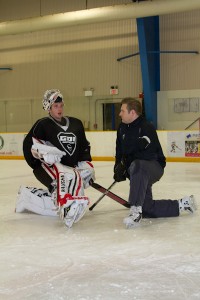
Q1: You’ve hung up the skates for the last time. What does representing players in the future represent for you?
A: For me it represents something that I didn’t always feel I had throughout my career, and that was a champion. There were a ton of people who supported me throughout my career whether it was my family, friends, or teammates, but there were times in my career where I didn’t feel as if people within the inner circle of an organization were fighting for me. I didn’t think that anybody was against me or didn’t like me, but I didn’t think that anybody was fighting for me either, and for a goalie that can be a lonely and hopeless feeling. I believe that every player needs an advocate, outside of their family, that is willing to invest in their career and support them. This gives me the chance to do that and to help other people achieve their goals.
Q2: You were like any other kid playing the game to reach a dream; when that dream didn’t come to fruition, how did your focus shift?
A: My focus actually didn’t shift too much. I’m still using the same type of attitude and approach I used in hockey for the next chapter in my life. I always knew that even if I did reach the highest level, that the sport would eventually get me one day and I would have to stop playing. So developing a good work ethic and finding new ways to develop wasn’t just for hockey, but it was also for life after hockey too. I think my experiences taught me how to handle all types of situations, both good and bad, and taught me how to stay patient. I’m only a few months removed from my hockey career, but I’m finding out quickly that this new job is the same as the old job; just find a way to learn and get better. That’s really my main focus right now and so far the transition over has been relatively smooth.
Q3: That legendary status you achieved as an athlete defined you as a goaltender. What made you tick? What was your game made of?
A: From an athletic standpoint, with me being only 5’7, I just felt that I didn’t have much of an option and had to be a great athlete. What we see in goaltending at the pro level is an amazing combination of size and skill. As a smaller goalie I pretty much had to find a way to survive. I played a very active and aggressive style and the only way I could play that way was if I was a great skater and very powerful. At the same time, when I was growing up I was always driven by the fact that my size meant that I always had to prove myself to people. In hindsight I think this was good and bad. It was good because it was the one thing that really kept me motivated and I actually saw great results with my training on and off the ice. But as I got a bit older I realized that that attitude was counterproductive because instead of worrying about myself and my development, I was only worrying about what other people thought of me. Eventually I grew out of that, but during my development years that was a big part of what kept me going.
Q4: By the time you caught up with the GDI Southeast coaches, you were a junior in college; your all business approach was evident. How important is being professional and representing yourself properly?
A: The professional type of approach I used for hockey was just something I grew up with. My father is big on discipline and hard work, but he’s also big on staying humble and finding different ways to develop. Also growing up with an agent in the house exposed me to the pro level and a lot of pro athletes from all different sports. So from an early age I saw what a pro looked and acted like and I was able to emulate what those guys did. I think that being a professional is important because even though hockey is a game it is also a job as well. It should be fun and you should want to do it, but just like any other job you have to pay your dues and stay open to learning.
Q5: For an aspiring goaltender in today’s competitive hockey market, what advice would you give them when it comes to advancing their opportunities?
A: My advice would be when you’re looking at options for the next path in your career, is to go where you’re wanted. I think a lot of guys get caught up in the pedigree of certain leagues or teams, but none of that matters if you don’t get a great opportunity at that level. You can say you play at some high profile level or for a high profile team but it pretty much stops after that. I’ve been in these situations, and not only are they hard to deal with on a day to day basis but they can also stall the advancement of your career. There was a time in mine where I moved backwards in terms of level. Ultimately I felt that I was good enough to play Division 1 hockey, so I tried to put myself in a situation where I could play a lot and prove myself. After that I just felt that if I did my job at a high level then somebody would notice, and fortunately for me that ended up being with Northeastern. Especially as a goalie I think it’s most important to put yourself in a situation where you’ll get the most time and where a coach will value you the most as a player.
Well said! Best of luck with your dad’s long standing company, Cornerstone Management, a Philadelphia based player agency. It’s been an honor to train and coach with you, and we know the next chapter of your life will be a great journey. Be proud of your accomplishments, we certainly are. Follow Bryan and his adventures on the road scouting talent @BMountain46 on twitter.
May 16, 2014
Q5 with Nick Lehr
For our Newsletter each quarter we will reach out to a different goaltender for the “Quarterly 5 (Q5)”. Asking 5 questions in an effort to examine the unique perspectives they have on their games.
In our 6th installment of the Q5, we caught up with long time GDI trained NAHL Austin Bruins goaltender #31 Nick Lehr. After finishing the season with a league best 35 Wins, posting a 5th best GAA and SP, winning the NAHL Showcase, awarded one Central Star of the Week, playing in the Top Prospects Tournament for a second year, being named to the All Division – Central Team, voted Team MVP by his teammates , winning the Central Division title, and making a trip to the league finals, Nick has certainly earned his mettle as one of the top goalies in one of the top Junior Leagues in the US. When his hometown University of Minnesota committed him for next fall, the 1993 born goaltender knew his time was now to make a run at the NAHL title. Attending the NDC: GDI EAST this summer for a second year, we are excited to welcome Nick Lehr to the Q5.
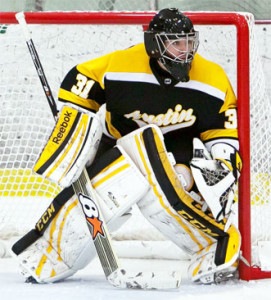
Q1: You just returned from the NAHL Finals. Tell us about the playoff run.
A: After two years of losing in the division final, it felt really good getting over that hump this third year. “3rd time’s the charm” was kinda my motto this year. Playoffs were a battle for us, but the most fun I have had while playing hockey. Playing in the longest game in NAHL history (a 4-3W to clinch their Division Series against Minot on April 12, lasting 117 minutes in triple overtime) was one of the most fun hockey moments I have ever had. The finals were a great experience. The fact the final was in Alaska, the atmosphere in Fairbanks was great!
Q2: Posting a 81-37-7 record and earning multiple accolades through your junior career as now the most highly decorated Bruin, is a hugely successful body of work. How do you feel you evolved through the course of those three years?
A: The first year I was a back up to a veteran goalie who taught me a lot. I didn’t play much but I learned what it took to get through such a long season and how to stay composed, stay up-beat, and stay healthy through a nine month season. I created a routine for myself that didn’t really change much over the duration of my career. Consistency is the key and my daily/weekly routine helped me feel comfortable during the entire three years.
Q3: Most goalies strive to be in your position. What do you feel are the challenges and pressures of being a proven NAHL starting goaltender?
A: It was definitely a lot of pressure proving myself day in and day out over the years. I just tried not to think about pressures and just enjoy going to the rink. The guys on the team each year have been a lot of fun and they are your family for nine months out of the year. Enjoying the season and hanging out with the guys on the team makes it fun to play each day, which relieved the pressure. It’s just a game, you gotta have fun when playing.
Q4: You are known to make saves “out of the box” and are a dynamic goaltender, how do you approach the position?
A: My game has actually changed a lot since the first season. The Head Coach, Goalie Coach, and summer Trainer did a lot for me. I started with a very wide stance and went down on all my saves. Last year my coach literally had me stand up for two weeks straight in practice, without going down, after a weekend I had been scored on high too many times. Just one of those things you don’t really think of but the rest of the season I noticed myself making more standing saves on high shots. I’ve narrowed my stance and I feel I have more power and mobility along with staying up more on high shots. The NAHL is a good league, I had to learn and understand situations and I watched a lot of video to see how I played weekend to weekend.
Q5: University of Minnesota chose you this season. That must have been a dream come true for a Minnesota guy, tell us about the recruitment experience.
A: It was definitely a dream come true! I grew up 5 minutes from the U of M and I remember going to games and thinking “This is where I want to be”. I did have a few other schools talk to me throughout the year but it’s a waiting game. I didn’t think of it as a distraction but more as motivation. Division 1 opportunity is what this league is about, and once you get that first call or talk after a game you want them to keep calling or keep coming back to see you. I was going on through the season just talking to these schools waiting for someone to make an offer when finally Minnesota did. I didn’t hesitate to accept. After I committed, a weight was lifted off my shoulders. All those years of working and it had finally paid off.
Bonus Q: After you received your commitment and the seemingly endless wait to find out where you were going to play college hockey was over, how did it affect you? A lot of players can let their foot off the gas and finish their year poorly.
A: Exactly, it was a relief to finally know what I was doing in the future. The main word from that sentence is future. I was still an Austin Bruin after I committed and the team was my focus. I know players that have committed and gone downhill at the end of their year. I did not want to be one of those players. After I committed I didn’t think that I could relax, I thought now I have to prove they made the right decision. I am competitive and to just stop playing is not in my blood.
What a junior career and promising future for Nick. Thanks buddy, we appreciate your time and can’t wait to continue working with you this summer to help prepare you for your college career. Follow the fun loving Nick Lehr on Twitter @LehrBear and check him out next year with the Golden Gophers @GopherHockey
Also GDI EAST Coach Elliott Hogue is the 3rd year Goaltending Coach for the Austin Bruins. Follow Elliott @ehogue86 and the Bruins @theaustinbruins
February 18, 2014
Q5 with Chris Funkey
In our 5th installment of the Q5, we visit with USPHL Premier Division Jersey Hitmen Goaltender #33 Chris Funkey. Championship Winning Goalie in the 2013 EJHL league title, 1994 born Chris was nearly undefeated during the regular season with a 34-3 record heading into the playoffs. Back for a second stint, the surprisingly composed, poised, and “undersized” goaltender is quit the character in the locker room and is a veteran leader on his club. We are excited to welcome Chris Funkey to the Q5.
Q1: Let’s begin with what was likely the most exciting point of your career to date. The 2013 Eastern Junior Hockey league (EJHL, and now the USPHL Premier Division) Championship last season with the Jersey Hitmen. What was that 3 game series experience like?
A: The overall experience was unbelievable! The games were extremely intense, and we knew any play could have been crucial to the outcome of the series. The main thing that I noticed myself doing was not over emphasizing the fact that they were still just 60 minute hockey games we were playing. In previous years I had really amped myself up for the playoffs, and kind of psyched myself out, so to speak. This resulted in me not playing my best hockey. Last year I went into the playoffs and the finals with a totally different mindset. I was calm, I trusted in my training and my preparation, and I went into every contest knowing that if I “played my game” the end result would be the one I wanted. We ended up winning in three games and the experience was surreal, hands down the best moment of my career.

Q2: After years in Chicago with the Mission, you landed with the Hitmen last season. Now in your second year, what have you come to appreciate from Junior Hockey and what is the environment with the team like this year?
A: I think that Junior Hockey has helped me to mature a great deal as both a goaltender and a person. Living so far away from home, I have had to become much more responsible and disciplined to make sure that I am always on top of my game. Our team this year is full of hard working, character guys. Everyone comes to practice every day and works hard. We all push each other to be our best in practice so that when game time comes, we’re prepared for whatever the competition throws at us.
Q3: Structurally, you don’t over rely on technique to get the job done, more so you have built your success around a competitive battle mindset. How important is doing it the “right way” to you and what are you still building on within your game?
A: Playing fundamentally sound goaltending is rather important to me, but in the end my game is based around my ability to battle. Over the past few seasons, I have found that I care significantly less about looking “pretty” than I do about making sure the puck stays out of the net. Currently, I am working with goalie coach Ryan Honick on the right time/situation to implement both the VH and Reverse VH positions. In addition, Coach Honick and I have been working on my play when a puck is passed back door.
Q4: You have set your goals very high with a Division 1 College or bust mentality. What are the challenges of setting and reaching that particular goal?
A: I feel that I am capable of playing Division 1 College Hockey, and at the same time I realize the work that needs to be done in order for me to achieve that goal. I put in a very large amount of time in the weight room this past off season to get myself in much better physical condition coming into the 2013-14 campaign. The big challenge I face is not getting discouraged when I feel that I am not getting very much interest from schools. I feel staying positive, and working hard every time I step on the ice will help me get to where I want to be.
Q5: On your squad, you have the “double edged sword” of seeing fewer shots than the opposing goalie on any given night. While some thrive with less pressure to stop an onslaught, some goalies can easily struggle on a good team that gives up maybe 2 or 3 scoring chances per game behind a dominant D core. How do you manage this?
A: I manage it by preparing the same way before every game, so that I can play to the same standard consistently. I try to remain focused no matter what, even though this can become tough to do when the puck is predominantly down at the other end of the ice. The idea is to remain ready at all times, so when there is a scoring chance, I am not caught off guard.
Great replies Funk, we appreciate your time and best of luck defending the Dineen Cup this Spring! Follow the always comical Chris Funkey on Twitter @Funkininright33
Coach Honick is the Goaltending Consultant for the Jersey organization. Winning 3 League Championships in its 1st 10 seasons, the philosophy that the Premier team has instilled throughout the program has build recent success on each of its’ teams. Follow the Hitmen on Twitter at @NJHitmen
November 12, 2013
Q5 with Jeff Jakaitis
In our 4rd installment of the Q5, we chat with ECHL South Carolina Stingrays Goaltender #35 Jeff Jakaitis. The Reigning 2013 Warrior Hockey ECHL Goaltender of the Month for October, ECHL Goaltender of the Week to start the month, and boasting a 7-0-2 Record with a 1.87 GAA and a .932 SP at the time of print, Jeff is off to a great start in his 7th pro season. Winner of the 2012 Reebok ECHL Goaltender of the Year Award, he has also played for 3 teams in the American Hockey League. We were honored to have Jeff on staff at the 2013 NDC: GDI EAST presented at Quinnipiac University as he added quite a unique perspective to our attending students as a current professional goaltender. With all of that experience beneath him, it is our pleasure to welcome Jeff Jakaitis to the Q5.
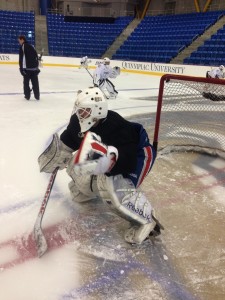
Q1: Let’s start off where we left off. You coached with us at the GDI camp at Quinnipiac, what did you take from that event? Whether pertaining to coaching philosophy or technical concept.
A: I really enjoyed the opportunity to coach at the GDI camp at Quinnipiac; it was great to work with the talented goalies and staff that attended. I think the aspect I enjoyed most was the dialogue among everyone throughout the week. I was really impressed with everyone’s motivation to learn, evolve, and express different points of view and I think that’s probably the most important thing I took away from the week. Goaltending is constantly changing and evolving and it’s important to study and keep improving all aspects of your game. I have never been an overly technical goalie but I learned a lot of terminology and techniques over the course of the week. I’m looking forward to more work in the future.
Q2: As a Minnesota High School (Rochester Mayo) and Division 1 (Lake Superior State) alumni, what were your expectations turning pro with the ECHL Columbia Inferno in 2007 and what is the biggest demand of the pro game?
A: To be honest I really wasn’t sure what to expect when I turned pro. The biggest difference I noticed from the start was the uncertainty of pro hockey. Coming out of college and high school, you commit to a school generally for four years and you know that’s where you’ll be. In pro hockey things can change very quickly, you can get called up, sent down, or released without any real warning so that was definitely a wakeup call. It’s really important to focus on your game and bring your best every night because if you don’t, you can get shipped out in a hurry. The biggest challenge is the schedule. In college you have an entire week to fit in workouts and prepare for two games; in pro hockey you have to learn to pick your spots a lot smarter. It makes it a lot more challenging to be consistent.
Q3: Your game is not like the “modern technical butterfly” goaltender. Yet you have achieved success at every level. How do you justify your game and what are the over-riding fundamental strengths within that game.
A: I’ve been able to incorporate more technique into my game through work with GDI but I think the two most important aspects of my game are being square to the shooter and depth. My coach in college named Don Muio always stressed being square to the shooter. The second thing I really focus on is depth, it’s important for me to take and hold as much ice as possible in order to make myself look bigger than I actually am. Those two things combined tend to give me a pretty good shot at stopping the puck. At the end of the day goaltending is all about stopping the puck to me, and I don’t get too concerned with how pretty it looks as long as the job gets done.
Q4: You have been dealing with this fact your entire career. You are a small goaltender. Most aspiring goalies are not 6’5”, like the elite level coaches and GM’s wish for. What challenges does this pose and how have you overcome them, technically or physically.
A: I was really lucky growing up to have a coach in squirts that stressed skating. I would have to do fifteen to thirty minutes of skating every practice before I ever saw a shot. I hated it at the time but it really laid the foundation for what has made me successful up to this point. As a smaller goalie you can make up for the lack in size by gaining a few extra inches of depth here and there. If you’re a better skater than the guy who is 6’5″ you can offset that height advantage. It’s definitely not the most enjoyable part of goaltending but you can never work on your skating too much. I’ve updated to more complicated “PSM” drills since the squirt days but I still work specifically on skating anytime I have a free moment on the ice.
Q5: How do you deal with a tough game or loss mentally? Confidence can be a fragile asset.
A: It may sound a bit cliché, but it’s important to have a very short memory as a goalie. Over the course of a season you are going to have tough losses or nights where you’re not at your best. I’ve had some good conversations with Director, GDI Carolinas Ted Monnich (who is pursuing a PhD in Sports Psychology) over the past few years about the mental side of goaltending. Things we’ve discussed include 1. the constant effort to improve and 2. training until failure. When you struggle or fail it can be a very valuable learning tool. Why did you fail? How can you fix it moving forward? When you look at a tough loss as a learning tool it can springboard your game rather than hold you back. One of the toughest things about goaltending is being consistent and it’s important to keep a very “in the moment” mindset. What happened on the shot before or what’s going to happen three shots from now isn’t important. All that matters is stopping the next shot. If you let in three early can you battle through it and make the big save late in the game to win 6-5 or do you give up? If you have a bad game can you bounce back and play well the next night? Anyone can play a great game under ideal circumstances, how do you play when you play under tough circumstances? The challenge is playing well on nights when you don’t feel good or things aren’t going you’re way. To me that’s what consistency is all about.
Thank you “Jako”, your time is appreciated. It’s great to have such an experienced and proven point of view. Keep rolling! Coach Honick is the Goaltending Consultant for the Stingrays this season, having the opportunity of continuing a 7 year partnership with Jeff.
July 15, 2013
Q5 with Anthony Borelli
In our 3rd installment of the Q5, we chat with ECAC Brown University Goaltender #33 Anthony Borelli. Anthony recently graduated with a degree in Economics and was named Academic All Ivy. He launched his professional career with a month long stint in Cincinnati with the ECHL Cyclones. His story should give us a realistic idea of what it might take for the majority of college hockey goalies to earn their day in the sun.
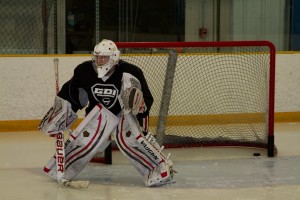
Q1: You just returned from your first pro experience in the ECHL, though you did not see playing time, what did you take from your time there and what are the differences between college and pro hockey?
A: Even though I didn’t get to see any game action overall it was a great experience for me and a big advantage in the learning process. The biggest difference I noticed was the amount of preparation and work ethic these guys brought to practice every day. They took each rep of each drill seriously and if you weren’t sharp in net the guys would make you look pretty foolish.
Q2: After a solid junior career in the BCHL and the USHL, Brown came calling and offered you a spot. While mostly watching upperclassman play in front of you for 3 seasons, what did it take to stay the course in an obviously frustrating situation?
A: Those three years leading up to my senior year were extremely frustrating. Watching a team struggle year in and year out while sitting on the bench is not a situation I would want anyone to be in. There were definitely high and low points between my freshman and senior year, but the one thing that had to remain constant was my work ethic. If I wasn’t diligent in the way I worked while not playing, I would hate to imagine my senior year not going as well as it did.
Q3: When you were thrust into the net this season, only to become the team’s savior and catalyst for a playoff run, how did you feel and what were your new found challenges?
A: I’m pretty sure my first thought was – don’t get pulled (laughs). Obviously I was thrown into a precarious situation not having had game experience in over a year. I still remember the nerves from that first game because I knew that if I didn’t win, even if I played well, there was a strong chance I wouldn’t be back between the pipes again. Fortunately the team played well in front of me and we ended up winning which was a huge relief. So from that game I could just focus on settling in and finding my game rhythm again. I’d say the biggest challenge I was faced with was helping a young and struggling team find an identity and gain confidence.
Q4: Carrying your team to the ECAC Championship game after beating #1 ranked Quinnipiac University in the opening round must have justified your efforts. What was your approach going into the title game and would you change anything or prepare any differently, knowing the outcome?
A: Yeah shutting out the top ranked team in the nation was a great feeling, but winning the championship would have been a much better one. By that point in the year I was so comfortable in my game time routine that what was on the line didn’t matter. I try to treat every game the same way, whether it’s an exhibition game or the ECAC championship. I feel that approaching each and every game in a business manner helps to cut out the emotions and nerves that you can have.
Q5: Working with GDI Southeast now for the last two seasons has helped to identify areas of your game that can become overlooked during the course of a long season. Though Brown did not employ a goalie coach during the year, what are the benefits of having one in your opinion?
A: The coaches at GDI have been extremely valuable in my development over the past couple years. Working with the GDI team has helped me to expand my goaltending repertoire while reinforcing good habits day in and day out. This is where, in my opinion, a goalie coach is most valuable. Over the course of a season goalies see hundreds of shots every day in practice and may find themselves using less than perfect mechanics as the day wears on. Over time, if not corrected, this can lead to bad habits. I feel goalie coaches are instrumental in correcting these bad habits before they start through reinforcement of proper technique and observation.
Thanks Ant, we are extremely proud of your efforts and determination.We look forward to seeing you play professionally this season and continue a career strengthened by perseverance. Best of luck!
February 21, 2013
Q5 with Nathan Lieuwen
In our 2nd installment of the Q5, we met with ECHL Greenville Road Warriors Goaltender # 30 Nathan Lieuwen. Nathan is a first year pro from Abbotsford, British Columbia, Canada and drafted by the Buffalo Sabres in 2011. He offers quite an experienced philosophy on things as a young 21 year old.
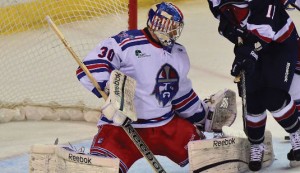
Q1: How has the transition from Junior to Professional (the WHL to the ECHL) been going, and what are the differences?
A: I played my junior thinking I was working as hard as I could, but now that I’m a pro, I see how much more work it takes to make it in this business. The transition has been thankfully pretty smooth but I had to learn quickly to have success at this level.
Q2: You have attended GDI National Development Camps (NDC) in the past and primarily worked with GDI Alberta’s Justin Cardinal, who is the Goaltending Consultant for your previous team, the WHL’s Kootenay Ice. What do you think has been the benefit of having a team of Goalie Coaches that you have worked with?
A: As a young goalie, there is nothing more important than understanding and mastering the fundamentals of goaltending. GDI and Justin especially, has been a key contributor to helping me improve on my mechanics and provide me with a strong base that I build my game off of.
Q3: Most of us struggle with managing the pressure of the position. Staying focused and confident in the face of adversity can be a difficult task. How do you handle the mental challenges of a game?
A: I have always enjoyed high pressure situations which has been a big help in the game of hockey. I have a routine I go through to get my mind ready for the game and certain words and procedures I go through to keep me in the zone during the game. On days where I’m on my game, I might use them a few times; and on days I’m not as sharp, I’ll use them more often to always bring my mind where it needs to be to play my best.
Q4: You were invited to the 2008 Canadian National Development Camp essentially trying out for the World Junior Championships. Having not been selected (though you were a 16 year old), you set a lofty goal and it was not reached, how do you deal with goal setting and what are your current goals?
A: I always have goals in mind when I play hockey. Motivation is what sets the best players apart from the rest. It’s not just important to set goals, but also to make a step by step plan to reach your goals. Even if I don’t reach a certain goal, I will create a new goal right away so that no matter what, I’m always working towards something. I always look into why I didn’t reach a certain goal but I believe it is always important to work towards a goal.
Q5: What are the keys to your game and how do you feel you have become your own best goalie coach?
A: The biggest key to my game is reading a play before it happens, and knowing how I will react to those options. I have always believed that each goalie is his best goalie coach. I take Ideas from each goalie coach I encounter and I apply and try to master the techniques and strategies that bring the most success.
Thank you Nathan, great perspectives. At the time of print, Nathan was called up to the AHL Rochester Americans. Best of luck for the remainder of the season!
October 10, 2012
Q5 with Steve Racine
GDI Southeast first spoke to University of Michigan Freshman and GDI Southeast affiliated goaltender Steve Racine this week to find out what it took to reach his college goals and what he thinks it will take to play moving forward.
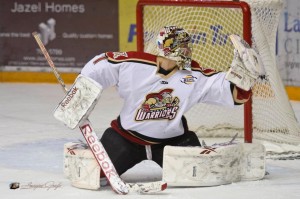
Q1: You are at the University of Michigan this fall preparing for your freshman year. How did this opportunity present itself?
A: I started talking to the coaches at Michigan last summer. I was able to have a strong season at both Westside in the BCHL and Georgetown in the OJHL and luckily attracted a few offers. I decided after my visit to Michigan in February that this was the place for me because of its great hockey program, outstanding academics, and opportunity to play right away.
Q2: You played on many Junior teams in many leagues leading up to this, when it wasn’t looking like a collegiate opportunity would present itself, how did you persevere?
A: After two successful seasons at the Taft School, I decided to leave before my senior year to play in the USHL for the Lincoln Stars. I made the classic mistake of rushing into junior hockey when I wasn’t ready physically and especially mentally. My first two years were a learning curve, as I faced much adversity. Ultimately, I used the lessons learned from those hard times to my advantage. I trusted in my ability and only what I could control. I learned it is not about where you play, but how you play and how much. These experiences have made me stronger and more prepared for the next part of my career.
Q3: What is your approach coming into the season knowing that you and fellow Freshman Jared Rutledge (USNTDP) will be battling for the net?
A: First of all, my approach will be to work my very hardest every day. In the situation I am in, you cannot worry about what other guys are doing. I have to make sure that I am at my very best every day.
Q4: Are you thinking short term or long term when it comes to development and what are those goals?
A: Right now I am thinking about what I need to do to perform at my best and make an impact on the team. I am learning to live and train in the present. I need to focus on the now rather than what the future holds because that is out my control.
Q5: You have been a student of many schools and spent many hours analyzing your game; where do you see the position headed?
A: I see the position heading towards a much more athletic game rather than a blocking and positional one. The game is becoming quicker and I feel the most successful goalies are the ones that move the best, are flexible, have good hands, and great scramble/battle ability. With all that said, fundamentals are extremely important and technique is the building block for consistent success.
Thank you Steve, best of luck this season, we’ll be watching.
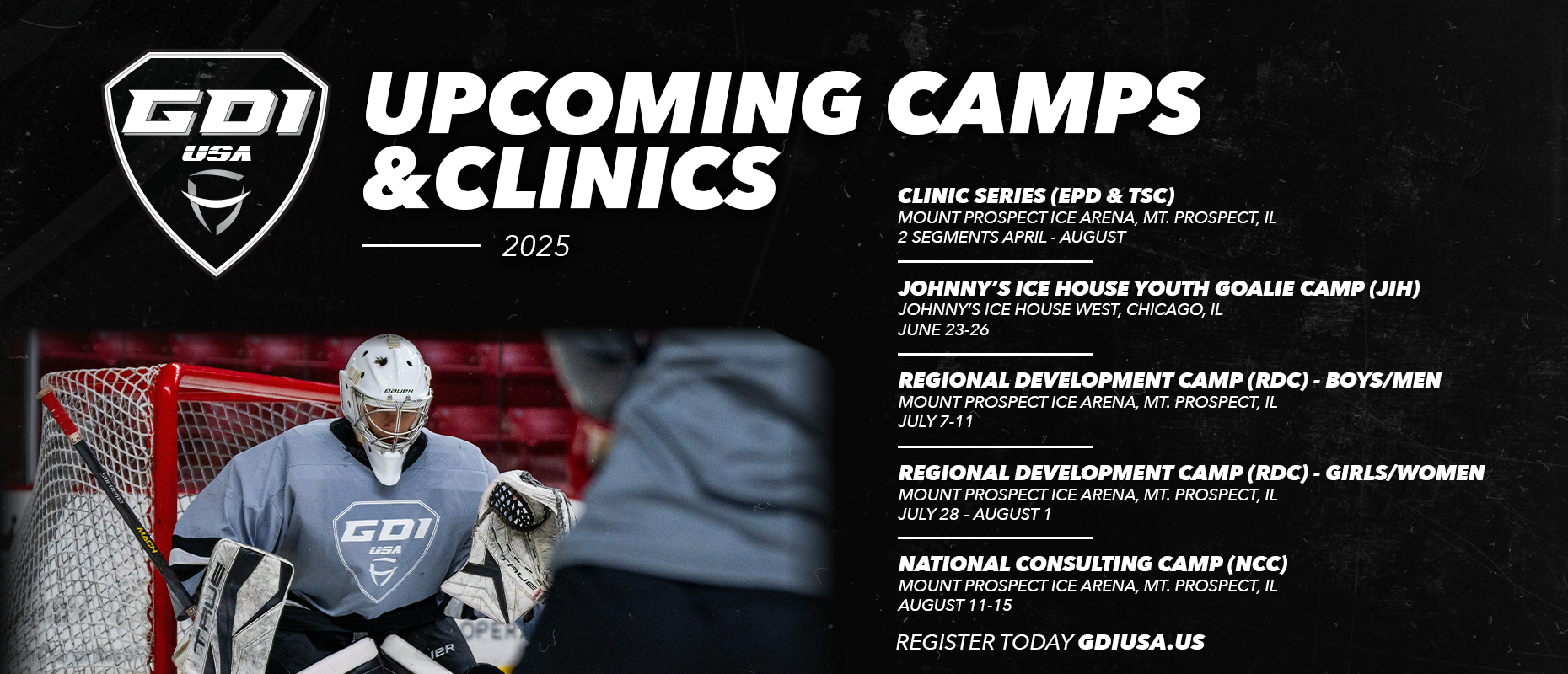

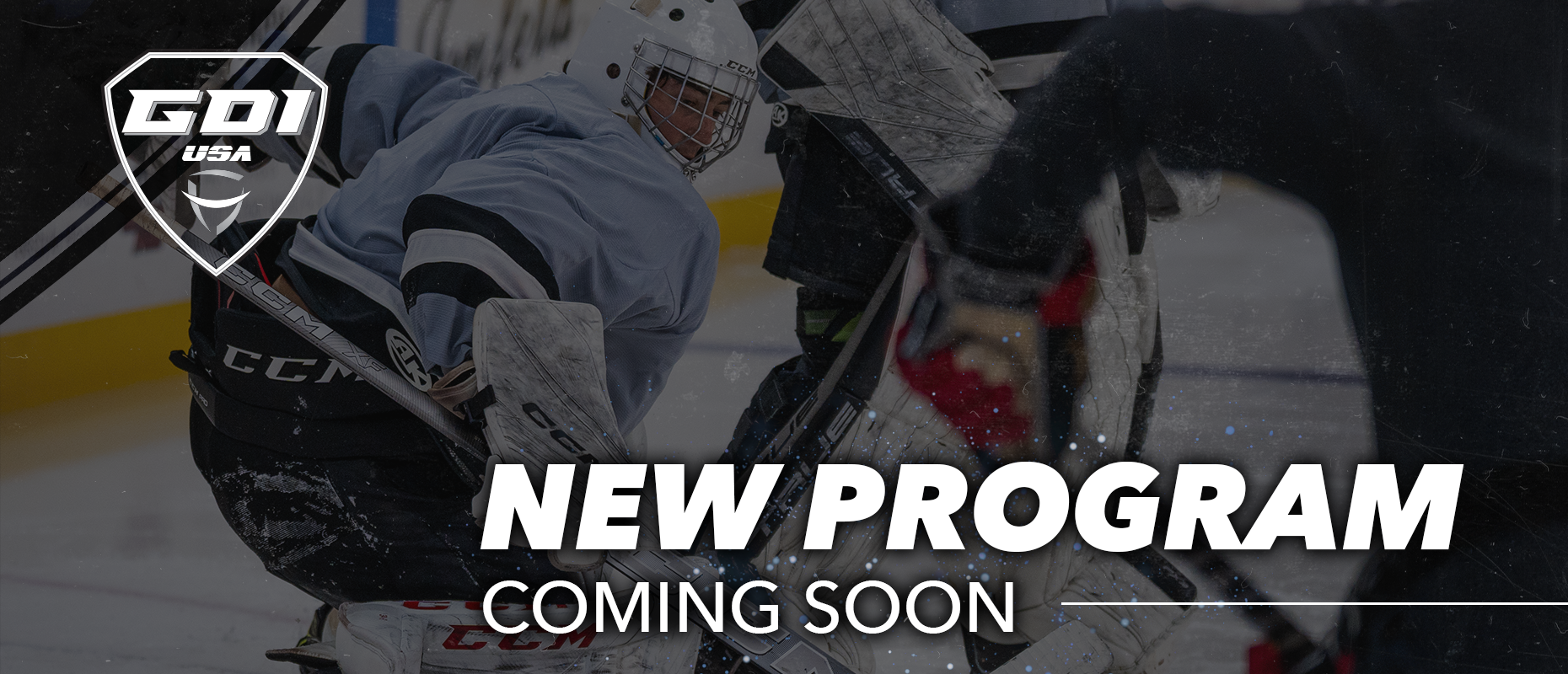
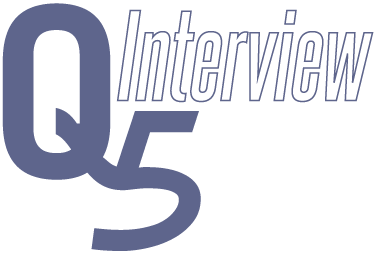

![IMG_4388[1]](https://gdiusa.us/wp-content/uploads/2016/03/IMG_43881-300x225.jpg)










